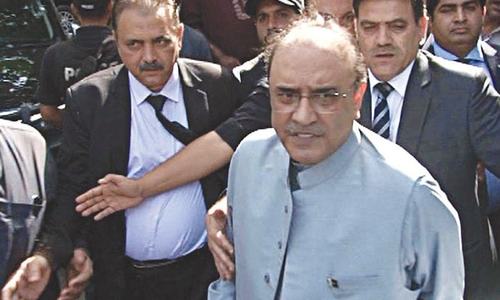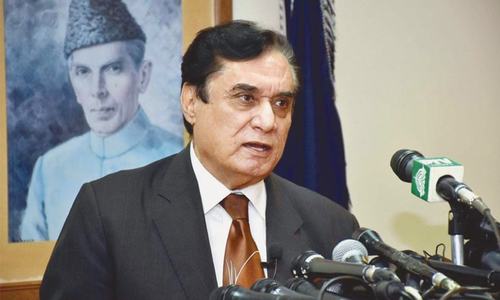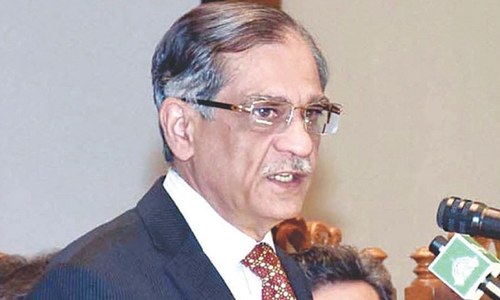'Is NAB's only purpose to make cases?': CJP Khosa takes accountability watchdog to task

Chief Justice Asif Saeed Khosa on Thursday took the National Accountability Bureau (NAB) to task while rejecting the bureau's appeal against the acquittal of a suspect in a corruption case and asked what the role of the accountability watchdog was.
"What does the NAB do after all? Is NAB's only purpose to make cases?" he asked.
A three-member bench of the Supreme Court headed by CJP Khosa heard the accountability bureau's appeal against the acquittal of a suspect named Attaullah during which the top judge remarked: "NAB should think about how its only purpose is not to make cases, the only purpose is not to 'pakar dhakkar' [catch and push] around [suspects]."
"NAB should also attach evidence for those who it has made cases against," he added.
The suspect, who was accused of corruption as a cashier at National Bank, was acquitted by a high court four years ago. NAB had appealed the SC against his acquittal.
"For 19 years, the suspect was being troubled," the chief justice remarked, adding that there was not enough evidence to prove corruption.
While asking what the purpose of the bureau was, the top judge remarked: "NAB's purpose is also to prove a case and have a suspect punished," he said, adding that because of the bureau's attitude, people were under mental pressure.
Separately, the apex court also rejected another appeal by NAB against a high court order regarding a deputy superintendent of police Jahan Khan in an assets beyond means case.
The SC said that a trial court had given the suspect a ten-year sentence and fined him. They added that in light of evidence, a high court had revoked the trial court verdict and acquitted the suspect.
The apex court said that the high court order was on the basis of the law and of evidence, and rejected NAB's request while maintaining the high court order. The SC noted that the suspect had received 120 kanal of property from his father, mother and sister.
CJP Khosa said that NAB themselves had written that the suspect had over Rs8 million in assets and had bought property for Rs4.6 million.
The top judge expressed displeasure at the accountability bureau and said that NAB should be fined for this.
"From 2001 to 2019, you were dragging [along] a person for no reason," he said, asking: "Who will be accountable for the 18 years that NAB has bugged Jahan Khan?"
"The law takes its own course — whether a person is acquitted or goes to jail, we have to make decisions on the basis of the law and of evidence."
Recently, the PML-N and PPP have slammed NAB chairman retired Justice Javed Iqbal over his controversial interview to a senior journalist, with the former seeking "an explanation" from him and the latter announcing that it will take "action" against him.
In his reported interview, the NAB chairman had predicted the arrests of many politicians, including former president Asif Ali Zardari, his sister Faryal Talpur, Aslam Raisani and Defence Minister Pervez Khattak, in the near future.
In March, the chief justice took notice of a purported suicide note left by retired brigadier and analyst Asad Munir and summoned a reply from the accountability bureau. In his note, Munir had expressed the confidence that he was giving his life in the hope that the chief justice would bring about positive changes in the system under which incompetent officials were playing with the life and honour of citizens in the name of accountability.
Earlier while hearing an appeal of former prime minister Nawaz Sharif on March 26, the chief justice had questioned the manner in which NAB functioned by asking whether the bureau caused so much stress to those facing corruption inquiries that they fell sick and why the bureau, which had recovered billions of rupees, did not set up a hospital for treatment of those who fell ill (because of pressure exerted on them).












































